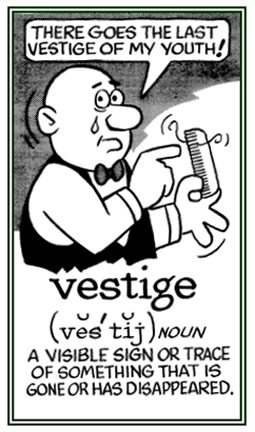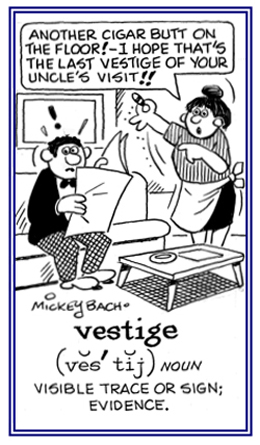vestig-, vestigi-
(Latin: footprint; track, tracking, to track, to trace)
investigable (adjective), more investigable, most investigable
That which is capable of being examined systematically; especially, in order to find the truth or facts about a situation: The investigable complaint by the customer about the vacuum-cleaner malfunction requires a thorough and careful review to determine if she should get a full refund or a new replacement.
investigate (verb), investigates; investigated; investigating
1. To observe or to inquire into details; to analyze according to a method: The police are investigating the robbery that took place in a jewelry store.
Sherlock Holmes investigated many criminal cases by following the footprints left at the scene of the crimes.
2. Etymologically, "following the footprints" is exactly what an investigator should do, because investigate comes from Latin in-, "in, into" + vestigium, "footprint, track, trace"; literally, "to follow footprints"; therefore, to search into something.
1. The act or process of observing or inquiring with the use of logical order and planning into the particulars of an occurrence or event: An investigation may not always involve people looking for footprints at a crime scene, but such methodical gathering of details and other evidence associated with a violation or wrongdoing is at the center of any investigation.
2. The procedure of researching into an activity or transaction thoroughly and methodically: The investigation of the crime may take months to complete because there are so few clues to indicate how it happened.
3. Etymology: investigation comes from Latin vestigium, which means "footprint" and investigare, "to track".
2. The procedure of researching into an activity or transaction thoroughly and methodically: The investigation of the crime may take months to complete because there are so few clues to indicate how it happened.
3. Etymology: investigation comes from Latin vestigium, which means "footprint" and investigare, "to track".
investigational (adjective) (not comparable)
A reference to a careful search or scrutinization of something in order to discover the facts and details about a situation: Mr. Gibbons, the lawyer, presented the investigational report made by the police to Judge Patterson.
investigative (adjective), more investigative, most investigative
That which is designed to find information or to ascertain facts: The investigative research done by Timothy, the reporter, uncovered and resulted in the presentation of hidden information about the corrupt involvement of the local politician.
A form of news writing in which reporters research a single subject of interest; usually involving misconduct, political corruption, or corporate wrongdoing: A journalist often spends months or even years researching and preparing an in-depth account for investigative journalism.
Anyone who has the task of officially determining the facts and truth about a crime or an accident in order to learn how it happened, who did it, etc.: Not all investigators solve offenses; however, to be an investigator a person needs to work hard to find evidence and reasonable facts that will justify accusing anyone of an illegal act.
investigatorial (adjective), more investigatorial, most investigatorial
A reference to that which can be studied, scrutinized, probed, or searched into: The law officer, Mr. Gregory, determined that the investigatorial crime did indeed present evidence that could lead to the conviction of the arrested suspect.
1. An indication or suggestion that something was present in the past: The vestiges of the footprints in the sand gave the biologist hints that a large turtle had crawled on the beach during the night.
2. An insignificant trace or amount of something: It was obvious that the politician had only a vestige or a fragment of truth in his speeches and so he never had a chance of being elected.

© ALL rights are reserved.

© ALL rights are reserved.
Go to this Word A Day Revisited Index
2. An insignificant trace or amount of something: It was obvious that the politician had only a vestige or a fragment of truth in his speeches and so he never had a chance of being elected.
There is not a vestige of factual data in the woman's accusation that she was mistreated by her supervisor when he asked her to correct several errors in the letter that she typed.
3. Etymology: from French vestige, "a mark, a trace, a sign", from Latin vestigium, "footprint, trace".

Go to this Word A Day Revisited Index
so you can see more of Mickey Bach's cartoons.
<img src="/img/left_arrow_sm.gif" alt="" /> <img src="/img/right_arrow_sm.gif" alt="" />
Showing 1 page of 9 main-word entries or main-word-entry groups.
